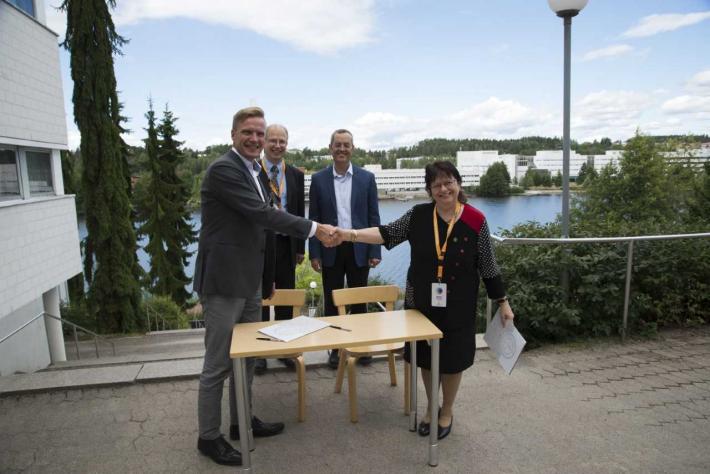The nanoscience centers of the University of Jyväskylä and the Bar-Ilan University of Israel will sign a collaboration agreement to start research and education collaboration
The nanoscience centers of the University of Jyväskylä and the Bar-Ilan University of Israel will sign a collaboration agreement to start research and education collaboration. Nanoscience Center at the University of Jyväskylä (NSC) will host a three-day BINA@NSC workshop to the Bar-Ilan University researchers on the 6th - 8th August 2018.
The meeting includes scientific lectures, excursion to research laboratories as well as signing a collaboration agreement. As a result, the Nanoscience Center at the University of Jyväskylä becomes part of the international multidisciplinary nanoscience center network coordinated by the Bar-Ilan Institute of Nanotechnology & Advanced Materials.
Dean of the Faculty of Mathematics and Science of the University of Jyväskylä Mikko Mönkkönen signs a collaboration agreement on Tuesday, 7th August 2018. Vice President Shulamit Michaeli and Director of Bar-Ilan Institute of Nanotechnology & Advanced Materials Dror Fixler represents the Bar-Ilan University.
Interdisciplinary nanoscience is booming
Nanoscience research has been conducted around the world for over two decades. The results of this research have had major effects on our everyday life. Today, consumer electronics is largely based on physics and chemistry-based nanoscale devices and the development of medical science requires a nanoscale understanding of biological organisms. At the same time, the scientists aim to minimize the harmful effects of the new materials for humans or the environment. Traditionally, scientists in physics, chemistry, and biology have worked in their own silos and the interaction between researchers has been limited. As a result, research results have moved slowly between research areas. To solve this problem, cross-disciplinary nanoscience centers have been recently set up around the world. In Finland, Nanoscience Center at the University of Jyväskylä has pioneered the field since 2004. The next goal is to develop the international cooperation between multidisciplinary nanoscience centers. The University of Jyväskylä Nanoscience Center is strongly involved in this process.
Collaboration starts with researchers
International collaboration is all about researchers, their research problems and the sharing of information. With mutual trust being at a high level, scientists working in partner organizations can rely on international colleagues at a low threshold. "Research and education collaboration between our universities will start in the autumn. Collaboration will help us to stay at the forefront of science and communicate our own results to our colleagues in Israel and the rest of the world. Particularly the high-quality research teams of Bar-Ilan and their excellent international networks will help us", says Tero Heikkilä, Scientific Director of Nanoscience Center at the University of Jyväskylä. Before signing this agreement Nanoscience Center at the University of Jyväskylä is already collaborating with the University of Kassel, Center for Interdisciplinary Nanostructure Science and Technology (CINSaT) and with Center for Chemistry at the Space-Time Limit (CaSTL). At the University of Jyväskylä Nanoscience Center, it has been found that exchanging experiences across land borders will help both partner organizations in research and teaching.
High quality partner
Bar-Ilan Institute of Nanotechnology & Advanced Materials is a few years younger than the Nanoscience Center at the University of Jyväskylä and has ranked well in international university rankings. Both centers carry out similar nanoscience research. In the future, research and education collaboration will be carried out between the nanoscience centers through staff and student exchanges and by conducting research visits.
"Both research and teaching are at in a high level in the Nanoscience Center at the University of Jyväskylä. Our visit in Jyväskylä will last only a few days, but we believe that we will get to know many scientists during that time and collaboration will start faster”, says Dror Fixler, Director of Bar-Ilan. During the visit, Prof. Dror Fixler will also lecture at the 28th Jyväskylä Summer School’s “Nanophotonics: Fluorescence and Plasmon Controlled Fluorescence” course. 25 students will attend the course. More than half of the participants are outside the University of Jyväskylä.




